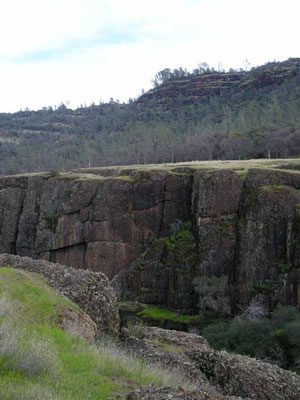
I drive through town to the semi-wilderness area just beyond this small city. Though a Friday with spring-like temperatures, college kids haven’t yet begun to stream into the townspeople’s sanctuary, a weekend playground for many of the students.
It hasn’t rained recently, so the gate demarcating the paved from the gravel road into the canyon isn’t closed. Park rangers keep another one locked about three miles in until the rainy season is completely over. I drive the bumpy road, park in the last parking area, and walk the half-mile to an overlook of the narrow gorge.
Taking my seat, I’m again instantly overwhelmed by the beauty of the gorge and the canyon. Two buzzards with finger-like feathers protruding from their long wingspans glide by close, their sharp eyes on swiveling heads intimating the closeness of death in nature.
Without effort or goal, an intense meditative state comes over one. It brings a strange ‘whooshing’ feeling, as the content of memory and stored up emotions is sucked away by the incredible beauty of the earth and the infinite emptiness of the universe.
For half an hour, I see no one in the miles of view. Then a young couple, with a big black poodle, walk by on the path 20 meters above and to my left. In a deeply meditative state humans, much less a funny-looking dog, seem incongruous. A tall, slender 20-something woman leads, and she turns and gives a friendly wave and knowing smile.
Over the next half hour about ten more people pass by, including a trio of college girls acting, well, like girls. A while after them, but apparently not with them, came a trio of college guys. The middle one turns and gives me the same friendly wave and smile that the young woman did earlier. Amazing what small things like that can do to strengthen one’s faith in humanity.
When thought stops completely, so does psychological time. The one cannot exist without the other. On my hike up the canyon, I ask: Can thought be quiet except when necessary to perform practical functions?
Some solitary backpacking experiences when I was a young man come to mind. After two nights alone in the wilderness, often marked by emotional and mental storminess, the mind would become completely still and remain so for the rest of the time in the wild. Thought would only operate when necessary to build a fire, cook a meal, read the map, etc.
Now I realize those experiences were sustained meditative states, when consciousness had taken on a completely different character.
As I labor up the rocky trail, I renew my intent to integrate that consciousness into ordinary life. To be able to function effectively and efficiently, and yet not lose the feeling of immensity that comes when one has direct relationship with nature and humanity.
There have been a number of times, though not many, when states bordering on what the Greeks called ‘aesthetic stasis’ have occurred around people. Most I don’t recall, but a funny incident gave me insight into why so few people free themselves from social conditioning and conventions.
I’d gone back to college in my late 20’s to finish my college degree. One morning a week I didn’t have classes, and since there was no river or creek running through the town, I’d drive 20 minutes or so to the Merced River and take a walk and sitting. That’s the same river that runs through Yosemite Valley, though this town was in the huge, flat, agricultural Central Valley.
One exquisite spring morning, content-consciousness became completely obliterated by attention to the movement of thought/emotion. The mind and heart felt like they’d been washed completely clean, and the brain was on fire with religious ecstasy.
I could drive, but I had to think about it. Nothing was automatic. There was no fear, since I’d completely let go. Driving back to town, I recalled that I’d agreed to meet a group of friends in the college cafeteria for lunch. When I entered the cafeteria however, there was just a sea of new faces. The meditative state was so powerful that it had temporarily erased even the program for recognition.
There was no pathology in it, just total newness. A little disconcerted nonetheless, I asked myself how I was going to recognize my friends. Just then, one of the fellows called to me as I stood there like a dolt next to their table: “Marty, what the hell are you doing?”
It snapped me back to ‘reality.’ I laughed, greeted my friends, and said to the fellow, ‘I couldn’t explain it to you in a hundred years.’
Martin LeFevre
